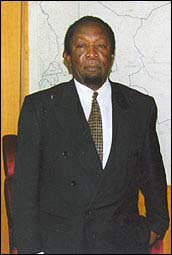 SLOW ECONOMIC RECOVERY SLOW ECONOMIC RECOVERY |

Thus far, there seems to be a slight up-turn on the economy. Better weather conditions paired with a series of economic measures are responsible for this. According to the former Minister of Finance, Hon. Masakhalia the economy is expected to grow from 1.8% in 1998 to 3% at the end of 1999. It seems the economy will grow on its own despite the constant changes in the Ministry of Finance, which has already changed hands three times this year. Reforms were started by Hon. Nyachae, who was substituted in February by Hon. Masakhalia, who in turn swapped positions in August with the former Minister of Energy, Hon. Okemo. According to Dr. Masakhalia, four priorities were set in the reform process of the economy: a balanced budget policy, monetary discipline, liberalization and privatization.
Excessive government borrowing in 1992-1994 prompted
a high growth in domestic debt. If large deficits
in the budget were to be maintained, this could
cause an increase of domestic debt, already being
serviced by 38% of the current annual revenue. A
balanced budget policy was thus needed in order
to reduce the excessive domestic debt. High interest
rates - Treasury Bills rose as much as 28% in 1998
- also contributed to an increase of domestic debt.
Henceforth a tight monetary policy was set into
place. In April 1999 TBs interest rates came down
to 9%, although they have slowly crept up to 14%
during subsequent months. |
Secondly, explains Dr. Masakhalia, the monetary sector has been closely scrutinized, maintaining low rates of growth in money supply. In 1998 the money supply growth rate recorded only a 3% rise, allowing a decrease of inflation levels to single digit figures, 6.6% in 1998 as opposed to 11.2% in 1997.
The liberalization process started in 1992 is now in full fledge. Although it has hurt some sectors due to the elimination of tariffs, notably agriculture and agro-industry, Kenya has set up strong anti-dumping measures in order to protect itself against market hungry countries such as South Africa, China or Vietnam, which have inundated the market with cheaper goods. However, this liberalization process has sent positive signs to prospect investors. The transaction of Kenyan Shillings is presently determined by market forces, there are no restrictions on transfers of foreign exchange and the licensing of imports and exports has been abolished.
The final policy priority area is privatization. Since 1993, 168 parastatal enterprises engaged in commercial and related activities have been privatized. However, critics argue that the largest state-owned companies, the so-called strategic parastatals, including Posts and Telecommunications, Railways, the Port of Mombasa or the companies in the Power Sector, have yet not been sold. The pace has also been said to be too slow. Mr. Dijo Owoor, Executive Director of the Federation of Kenya Employers hit the spot when he said that "the problem that we have is that where is the capital going to come from?". Indeed, with the economy depressed, and the recent skyrocketing interest rates, potential investors have retrenched waiting for better times. |

